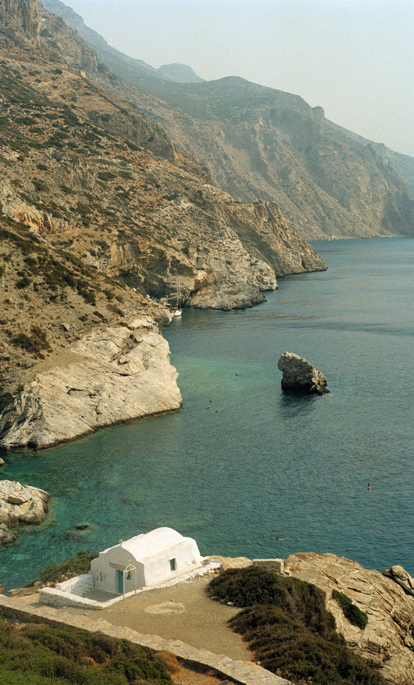
A few suggestions to get the holiday planning process started

We have travelled all over mainland Greece and its island-studded ocean to seek out the best spots, allowing us to plan truly bespoke trips. Whether touring the Acropolis with an art historian or meeting seasoned ceramicists at a local workshop, we work with the best local guides to help you get under the skin of Greece. We know how to avoid the crowds and the heat (like only booking Olympia tickets after 4pm), while our clued-up Concierges are our eyes and ears on the ground, offering insider tips on the hottest tickets and newest openings. This means we can recommend hidden island hideaways before the masses find out about them...
ENQUIRE NOWDiscover different ways to explore Greece
Practical advice and inspiration to help you prepare for your holiday
Our passionate consultants have travelled the length of Greece, from the picturesque Peloponnese to the most far-flung Aegean islands, picking up gems along the way to share with clients. With our breadth of expertise, we tailor each experience to you (and we’re not afraid to get creative). From organising tours with a local archaeologist guide at ancient sites to arranging an authentic cooking class with a local family, we're always led by your interests. We're in the know of incredible properties you're unlikely to find on your own and can recommend the best times of year for luxury boat trips and remote island adventures.

The blue island-dotted sea makes this an ideal seaside destination. It is also ideal for lovers of history and archaeology, particularly the Peloponnese peninsula and the island of Crete. Continental Greece and Crete are ideal adventure playgrounds for hikers. Looking for authenticity? Relax in a harbour-side tavern and watch the old Greek fisherman return from a fishing trip. Enjoy a glass of ouzo beneath an olive tree to the sound of crickets, or watch a priest play backgammon with some of the older villagers. In the mood to party? Both Athens and the fashionable bars in the Psiri district - haunt of hip young Athenians - are definitely worth a visit any time of year. For their party atmosphere, Mykonos and Paros are also must visits. Santorini and Mykonos are the perfect romantic setting for a honeymoon in Greece
Much of what you find on a Greece holiday you won't find anywhere else: There is history and mythology everywhere you look. Once you spot the small white villages, blue-roofed churches, whitewashed walls and flower-filled alleyways, there'll be no doubt that you are in Greece. The country has an unmistakable Mediterranean atmosphere but with a touch of eastern influence. This fusion can be found in the Greek traditions, music, cooking and attitudes to life. At the heart of it all lies a deep-rooted sense of hospitality. Inland Crete has olive fields as far as the eye can see, traditional villages with old ladies in black garments, donkeys in the middle of roads, canyons, mountains, archaeological sites and monasteries. Corfu, the centrepiece of the Ionian islands, is blessed with Byzantine architectural masterpieces hidden among its verdant hillsides, including the Castles of Angelokastro and Kassiopi. The island’s pastel-painted villages resemble those found throughout the Tuscan countryside.
If you only have a couple of days in Greece, make your way to Athens for a complete change of scene. The most popular Greek holidays remain island-hopping voyages of discovery in the Cyclades. We’d recommend visiting no more than two islands in one week or three over a fortnight, depending on flights, ferry bookings and transfers, so you have enough time to explore each one. For more cultural discoveries, opt for either the classic sites of the Peloponnese over one week, Central Greece for its gorgeous gorges and Meteora monasteries, or Crete for a road trip. Rhodes offers the ideal mix of beach relaxation and historical heritage, boasting one of Europe’s largest remaining medieval cities and ruins from its occupation by the Knights of St. John during the Crusades.
On the mainland, the three-pronged peninsula of Halkidiki may not be that trendy, but it is home to white sand beaches and some excellent hotels for families, making it a fantastic destination for a luxury Greek holiday. The bewitching Peloponnese peninsula to the west of Athens is back on the map in a major way thanks to a slew of new hotel openings. This is the place where one of our favourite explorers - Patrick Leigh Fermor - eventually laid his hat. It's possible to choose from immaculate new family-friendly resorts, romantic retreats for couples and even an Aman. Throw in a host of the finest sites in antiquity and it's a winning luxury holiday formula.
Of the thousand-odd islands scattered around the Aegean, the Cyclades are perhaps the most evocative. So named because they encircled the sacred island of Delos (once central to Greek mythology) these days the most famous islands of the group - Santorini and Mykonos - draw a different kind of worshipper, with the ancient gods and goddesses replaced by models and DJs.
Über-chic Mykonos is the Ibiza of the eastern Mediterranean, a summer playground where Europe's hip young things party till dawn beneath the island's iconic windmills. Crescent-shaped Santorini is one of the most scenic islands in the world (it was formerly known as Kalliste, meaning 'the most beautiful one'). Thought by some to be the site of the legendary Atlantis, it is hard to imagine the force of the cataclysmic volcanic eruption that created its giant, sea-filled caldera and towering, 300-metre cliffs.
With thousands of Greek islands to choose from, why not try somewhere new on your next trip to Greece? Amorgos is one of our latest top picks for its wild and well-preserved beauty, best appreciated while hiking. Patmos is a little gem that can be hard to access but provides a genuine spiritual break for many. Chios is perfect for lovers of eco-tourism and another one of our latest top picks.
There is a huge range of charming or designer hotels, but also alternatives to traditional hotels such as the cliff-side Homeric Poems apartments for four. Then there's Strass, a three-bedroom guest villa in Santorini, a villa around 300ft from the sea in Agia Irini sur Paros, or an apartment in a village of Crete in Kutsunari.
Enjoy something more bucolic and organic, such as thalassotherapy at the Royal Mare Resort in Agios Nikolaos, Saint Nicolas Bay. Or eat homemade jam and melons from the gardens of the traditional Kamares Houses, or organic and shiatsu cuisine at Elia Hotel & Spa, all found in Crete.
The country experiences a Mediterranean climate, meaning Greece holidays are best enjoyed during the summer months (from June to September), although there are variations in weather depending on which region you visit. In general, Mainland Greece experiences shorter summers and colder winters, with a more balanced climate (avoiding extreme heat) during April, May and September. The Cyclades Islands are blessed with long summers, lasting up to six months, with mild but windy winters. The Ionian Islands also have hot, dry summers, with little exposure to wind, although experience more rainfall during the winter months. Located closer to the Turkish coast, the Dodecanese Islands see hot summers and mild winters, with occasional rainfall. For more information, visit our guide page on the best time to visit Greece.

Our team of destination experts will get to know you and your unique requirements for your holiday

We work with you to build an ultra-personalised holiday itinerary with your choice of accommodation, experiences and activities

All of our holidays include little extras designed to make a big difference to your trip, from fast-tracking you through airport check-in and security to our network of local Concierges